Policy and Planning Innovation
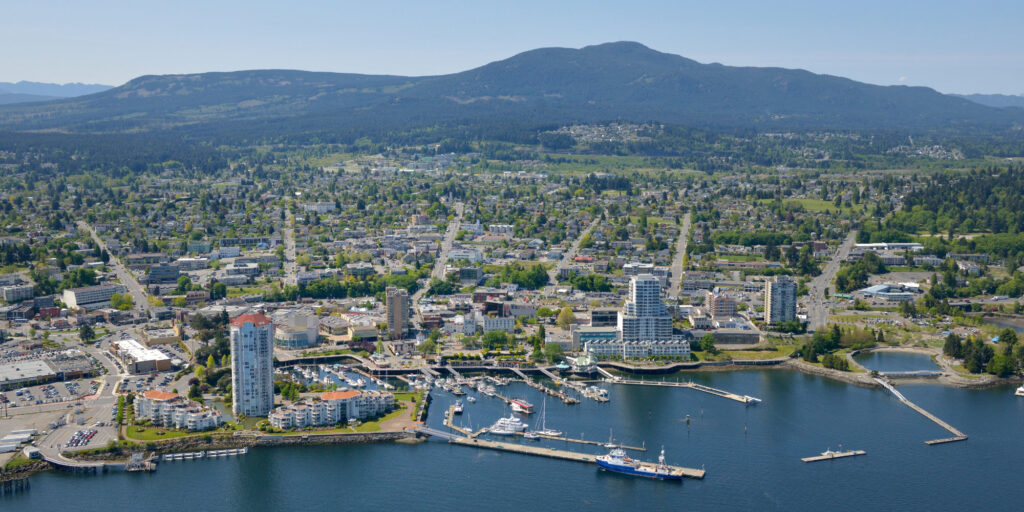
BC ENERGY STEP CODE AND ZERO CARBON STEP CODE IMPLEMENTATION STRATEGY
City of Nanaimo
In Oct. 2023, the City of Nanaimo became the first municipality to accelerate implementation of the Zero Carbon Step Code and the upper steps of the BC Energy Step Code. Modeling indicates that, by implementing changes six years ahead of schedule, Nanaimo could avoid up to 3,800 tonnes of GHG emissions by 2030 and up to 24,800 tonnes by 2050.
Ahead of this decision, the City of Nanaimo partnered with the Regional District of Nanaimo, Town of Qualicum Beach, and District of Lantzville to develop a strategy to support energy efficient, low-carbon buildings through technical and policy analysis, and through industry and staff engagement.
This led to engagement with 150 industry stakeholders including developers, builders, architects, engineers, contractors and energy advisors. Based on the engagement results, emissions modelling and analysis of the local context, the City of Nanaimo will require the top level of the Zero Carbon Step Code for all applicable new buildings starting July 1, 2024 and Step 3 of the BC Energy Step Code for new Part 3 (large, complex) buildings starting in 2026.
NEIGHBOURHOOD CLIMATE ACTION PLAN
University of British Columbia
In 2024, the University of British Columbia adopted a Neighbourhood Climate Action Plan (NCAP) which sets a pathway to net-zero and climate resilient residential neighbourhoods on UBC’s Vancouver campus. The NCAP establishes ambitious targets to reduce community emissions from buildings, transportation and waste: 30% by 2035 and net-zero by 2050.
The NCAP was developed with a collaborative approach including the public, staff and academic expertise, the University Neighbourhoods Association and the UBC Properties Trust. The plan’s measures include requiring new buildings to meet the Zero Carbon Step Code, expanding EV charging infrastructure, and decarbonizing the Neighbourhood District Energy System (NDES).
Additionally, the plan addresses often-overlooked aspects of climate change. In terms of the emissions required to produce building materials, the plan aims to reduce embodied carbon 40% by 2030. To support climate resiliency, the plan establishes design requirements to prevent overheating in buildings (the first of their kind in BC). Actions to enhance the natural environment will increase cooling shade and reduce damage from extreme weather events while also enhancing the community’s sense of place and personal well-being.
- https://planning.ubc.ca/NCAP
- https://planning.ubc.ca/news/new-climate-action-plan-ubcs-neighbourhoods
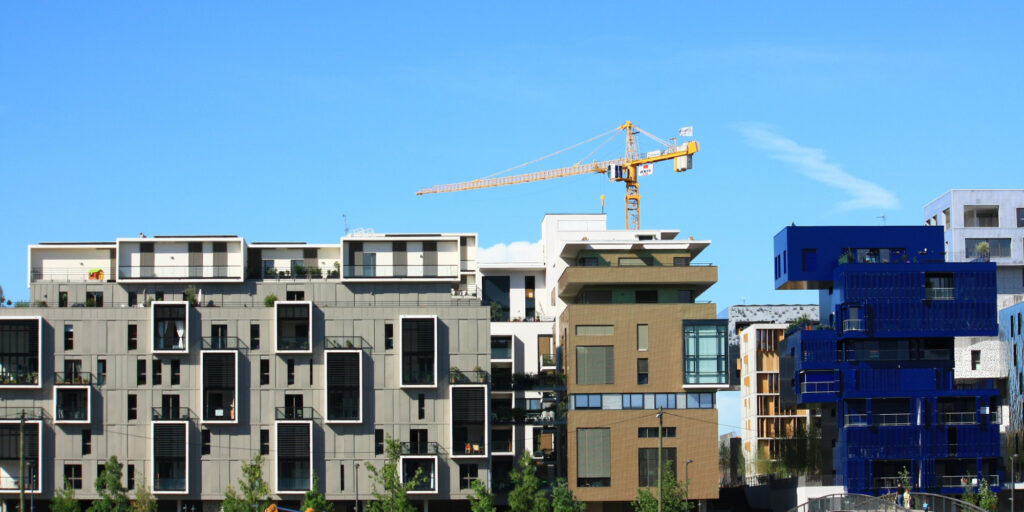
TAX EXEMPTIONS FOR RENTAL APARTMENT RETROFIT ACCELERATION
City of Victoria, District of Saanich
Municipal revitalization tax exemptions are commonly used to preserve heritage districts and support downtown revitalization. In 2024, the City of Victoria and the District of Saanich launched BC’s first revitalization tax exemption designed to encourage electrification of heating and hot water in commercial, multi-unit residential, and mixed-use buildings.
As part of the rollout, rental building owners may receive support from LandlordBC, which will support them in exploring options, building a business case, applying for the tax exemption, and throughout the project delivery. Successful applicants may receive a tax exemption up to 100% of project costs for multi-unit residential buildings and between 50-80% of project costs for commercial buildings.
This initiative is built upon considerable research and industry engagement both municipalities partnered on program design, adopted matching bylaws, secured funding and established contracts with LandlordBC for the concierge service.
- https://www.victoria.ca/community-culture/climate-action/rebates-resources
- https://www.saanich.ca/EN/main/community/sustainable-saanich/climate-change/programs-rebates/climate-tax-exemption.html
Public and Industry Engagement
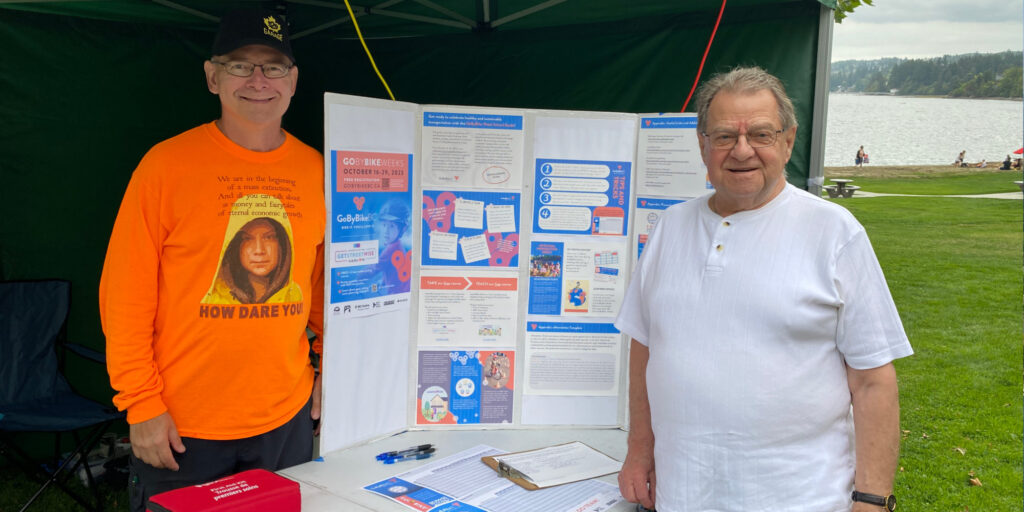
ACTING FOR CLIMATE TOGETHER
City of Nanaimo, Regional District of Nanaimo
Acting for Climate Together (ACT) is a community-based engagement initiative that encourages participants to take action to reduce their carbon footprint and become drivers of change. Participants are awarded for completing climate actions pulled from the ACT tool kit or a “big action” created on their own. Participants attend monthly meetings to share their work, connect and learn from each other and take in presentations from government staff and local climate leaders.
Members of ACT are groups like neighbourhood associations, religious groups, recreational clubs, school groups, and others. For program participants, collaboration with each other and municipal staff is key. The program essentially operates as a peer network that encourages knowledge sharing and collaboration among participants.
![]()
CLIMATE ACTION TRACKER
City of Surrey
While many cities have climate action plans, few have an accessible means to regularly communicate progress to the community. The Climate Action Tracker was developed to share the City of Surrey’s progress towards achieving the targets, goals and actions in the Climate Change Action Strategy (CCAS). Surrey was the first in BC and second in Canada to launch this kind of interactive platform providing analytics, supplementary information, and progress updates.
The tracker brings the CCAS to vivid life, enabling community members to drill down into the plan, understand how goals are meant to be accomplished, see the current status of action implementation, and who is responsible for actions. The tracker promotes a high degree of accountability for achieving the city’s climate commitments, and even acts as a project management tool for internally coordinating staff workflows.
Highly replicable, the tracker serves as a model for other jurisdictions seeking to report transparently on the implementation of their climate action strategies.
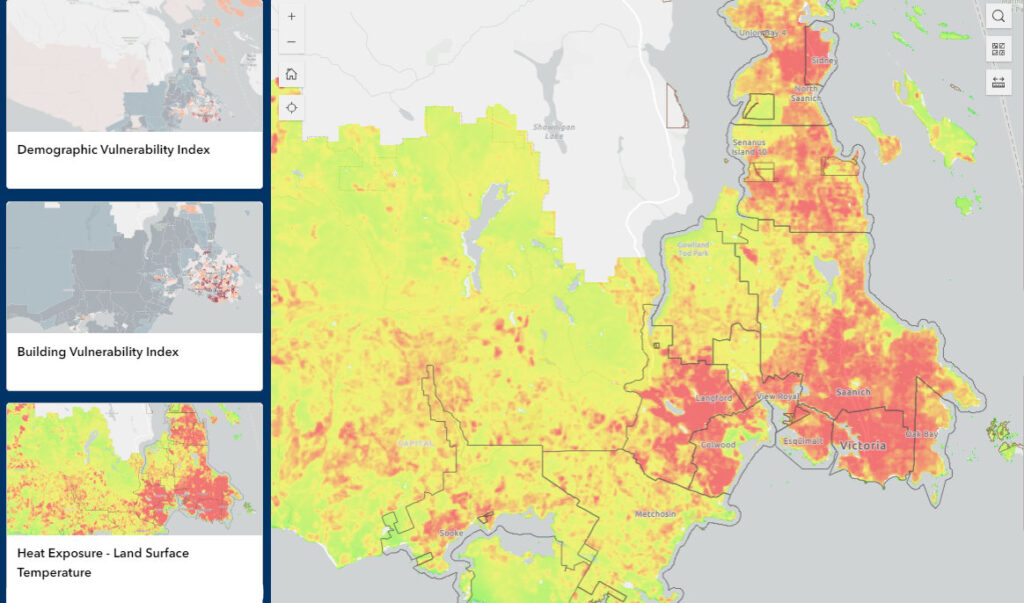
EXTREME HEAT INFORMATION PORTAL
Capital Regional District, City of Langford, District of Oak Bay, District of Saanich, Town of Sidney, and City of Victoria
The Extreme Heat Information Portal consists of an interactive, online map and accompanying research providing a highly localized picture of heat vulnerability in the capital region. The map combines two original indices to show where demographic characteristics (such as heart disease, substance use disorder, low income, or living alone) overlap with building characteristics (such as age, height, dwelling type), showing areas where vulnerability to heat is heightened.
Additional educational materials, providing in a storymap format, walk readers through the project and help them understand extreme heat and its impacts. The incorporation of stories of lived experiences adds a human element, fostering a deeper connection and understanding.
The portal resulted from a collaborative effort between the Capital Regional District, municipal partners, Island Health, and the Province of BC.
- https://heat.prepareyourself.ca
- https://ln5.sync.com/dl/430461a30/66ysr3im-qg62qbqq-qtfqxjzm-b8pmi6gg

FOOD CYCLER PILOT PROJECT
District of Mackenzie
When organics are landfilled, they become a significant source of greenhouse gas emissions. The District of Mackenzie partnered with FoodCycle Science to pilot a system that keeps food waste out of the garbage.
Households were able to purchase a FoodCycler counter-top appliance that recycles food waste overnight, producing a nutrient-rich fertilizer. In exchange for participating in a 12-week study, participants received a discount on their purchase. The pilot reduced greenhouse gas emissions from landfill and is also saving the municipality $2,400 annually in tipping fees. Participants in the study appreciated the environmental benefits and also felt they were keeping their homes safer from bears by removing food waste from their waste bins.
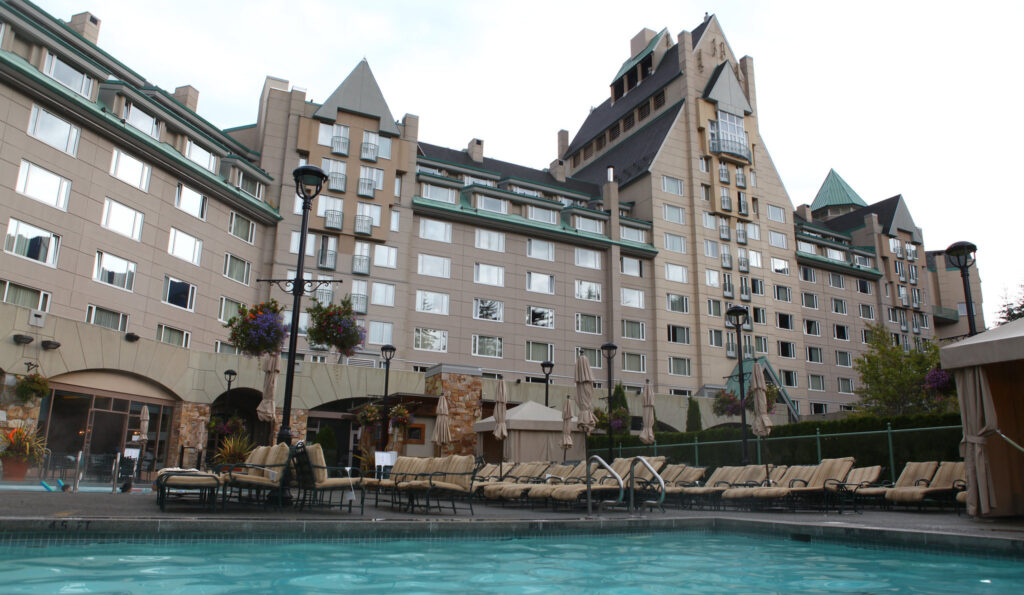
HOTEL DECARBONIZATION
Resort Municipality of Whistler
Almost a quarter of Whistler’s community-wide GHG emissions come from natural gas use in commercial buildings. As part of their goal to cut this natural gas use by 40% by 2030, the Resort Municipality of Whistler has organized the “Carbon Reduction at Your Hotel” workshop series for the managers of Whistler’s largest hotels.
Three workshops will be held over 2023–24, introducing hotel managers to ways to reduce energy use in hotels, methods for quantifying energy consumption, and resources for planning low-carbon retrofits. Project partner Prism Engineering is also offering free coaching to workshop participants to help identify energy conservation and fuel switching opportunities at their hotel.
- https://www.whistler.ca/climate-action/big-moves/
- https://www.whistler.com/sustainability/
- https://www.whistler.com/blog/post/2023/10/17/whistler-changemakers-four-seasons-whistler/
High-Performance Building
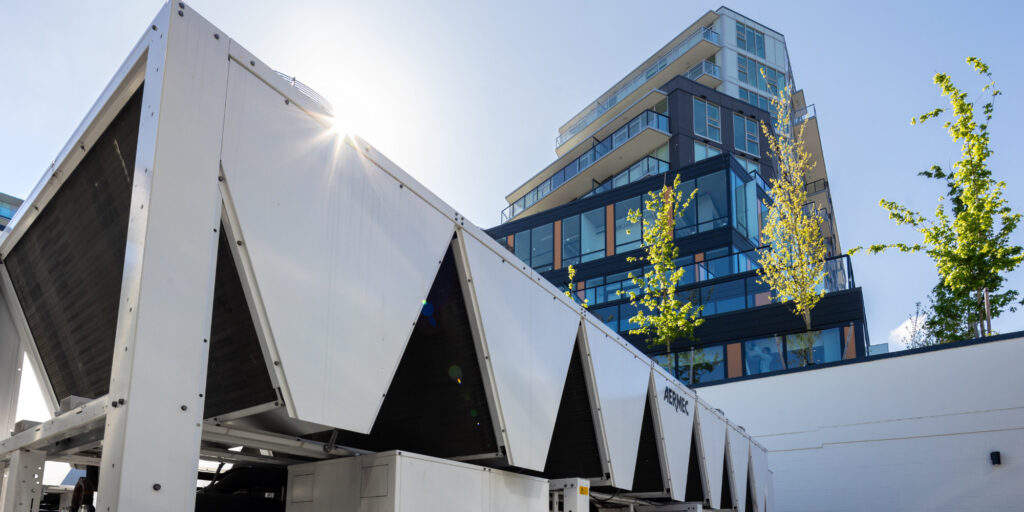
CITY CENTRE DISTRICT ENERGY UTILITY
City of Richmond
District energy systems centralize energy production for space heating, cooling, and domestic hot water heating, servicing all types of customers in a given service area. In itself, this is a more efficient way to deliver energy, but it also creates the opportunity to bring low-carbon energy to whole communities at a time. The City of Richmond’s City Centre District Energy Utility (CCDEU) is a phased approach to developing what could be North America’s largest district energy system. By 2050, the utility is expected to service 170 new residential and mixed-use commercial development sites and 50 million sq. ft. of floor space, reducing cumulative greenhouse gas emissions by over one million tonnes.
The CCDEU is funded by a public-private partnership established in 2022. Under the agreement, Corix Utilities is designing, financing, building, and operating the system. The Canada Infrastructure Bank provides low-interest financing, covering 60% of the capital costs for the first 10 years up to $175 Million.
The CCDEU is being developed in phases, starting with smaller power plants that can be connected to a unified district energy system once the area hits sufficient density. Since 2022, three developments have joined the CCDEU, with another planned for 2024, each featuring its own Low-Carbon Energy Plant to provide space heating, cooling, and domestic hot water heating. By 2028, a Permanent Energy Centre using sewer heat recovery will be operational, displacing the need for natural gas boilers and using energy that would be otherwise lost.

JUMP ON A NEW HEAT PUMP
District of North Vancouver, City of North Vancouver, District of West Vancouver
The Jump on a Heat Pump Program is available to residents of the North Shore municipalities who are looking for help completing energy efficient upgrades. Participants are connected with an Energy Concierge, who is available to answer questions, provide support, and give expert advice throughout a resident’s home energy upgrade process.
The concierge can support homeowners with: finding an Energy Advisor or qualified contractor; making a plan for associated upgrades; understanding the permitting process; communicating with contractors; quotation review; applying for CleanBC rebates; and other services as identified by homeowners. With one-on-one dedicated support, the Program now ensures that homeowners have assistance through all of the necessary steps to complete the heat pump installation and energy upgrades in their homes.
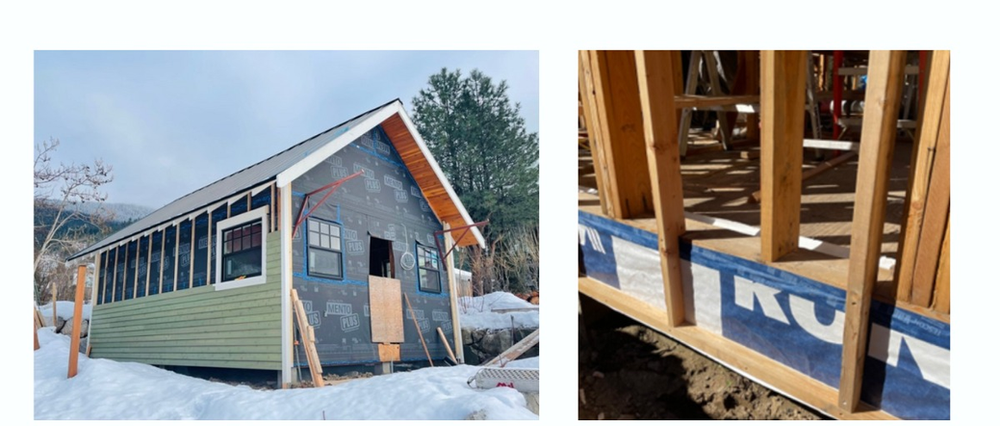
LOW CARBON HOMES PILOT
City of Nelson
The City of Nelson developed the Low Carbon Homes Pilot to address the embodied carbon in construction materials—emissions associated with the manufacturing, transportation, and disposal of building materials and products, contributing approximately half of a building’s total lifetime emissions. Active since 2021, the Low Carbon Homes Pilot has established Nelson as a leader in embodied carbon research, policy, advocacy, and education.
To launch the pilot, Nelson established baselines for achievable low embodied and operational emissions construction (based on 34 homes) and formed an Embodied Carbon Advisory Group to foster industry collaboration, and produced numerous research and educational resources.
In 2023, the Low Carbon Homes Pilot focused on advocacy and education by engaging the builder community with case studies, tool kits, and workshops delivered in partership with BCIT. The Low Carbon Homes Pilot website lists educational fact sheets on low-carbon concrete, reducing embodied emissions in retrofits, and case studies like a profile of Rokform Solutions, a local concrete supplier. “Building Better in the Kootenays” shares key findings from a series of free embodied carbon analyses and consultations offered for for local building projects.
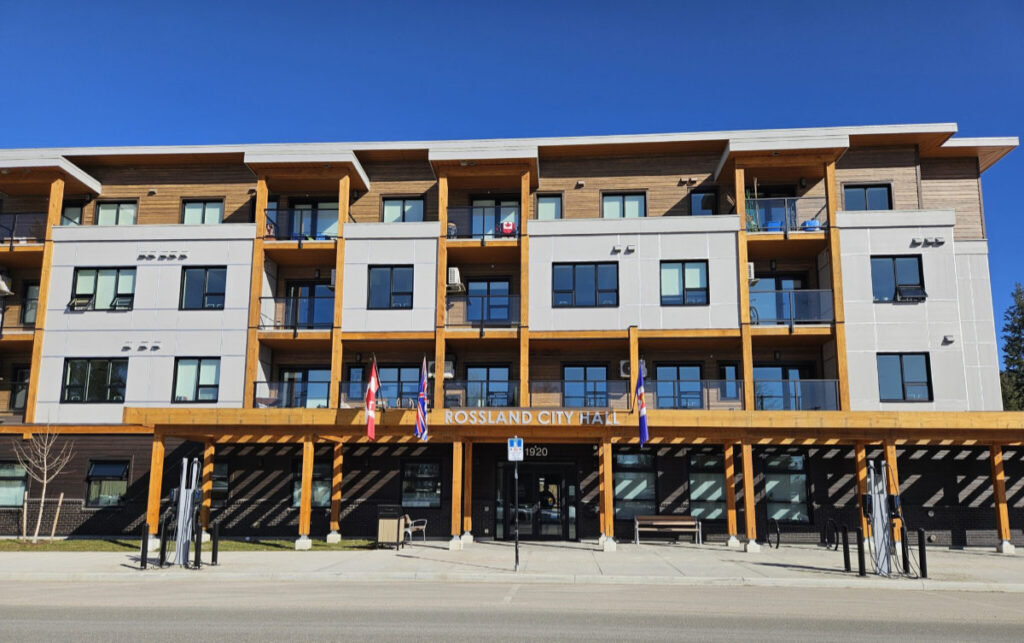
ROSSLAND YARDS
City of Rossland
The City of Rossland partnered with the Lower Columbia Affordable Housing Society to turn a former rail yard into a four-storey, net-zero ready building with 37 affordable workforce housing units and the new City Hall on the ground floor.
To achieve Step 4 of the BC Energy Step Code and to meet the net-zero energy ready standard, the building used efficient mechanical and electrical systems, a highly insulated building envelope, high-efficiency windows, high efficiency heating and cooling systems and LED lighting.
The $16.4 million project was made possible by funding from BC Housing, Columbia Basin Trust, and the Federation of Canadian Municipalities’ Green Municipal Fund (in collaboration with the Government of Canada).

